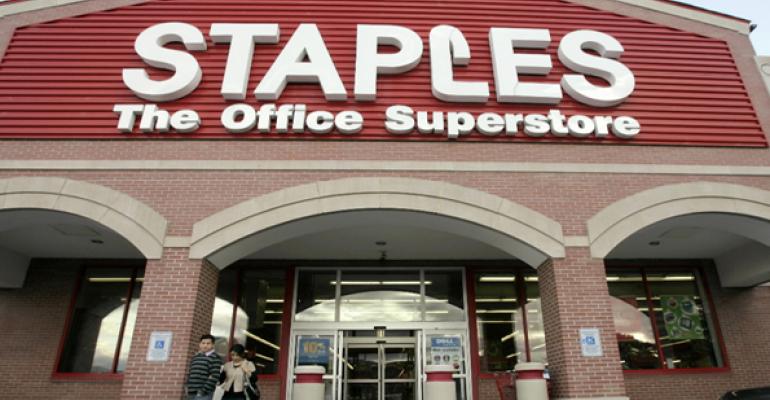(Bloomberg Gadfly)—Staples Inc. is going to reinvent itself one way or another.
The office-supply chain is in early talks to sell itself to private equity, in a deal that could value the company at $7 billion, The Wall Street Journal reported Tuesday.
The timing couldn't be better: Staples was in the midst of a transformation already. It's been shifting its focus from serving individual customers looking to stock up on ink cartridges and No. 2 pencils. Instead it's trying to become a more profitable company centered around serving businesses big and small. It's also branching into new offerings, such as a co-working space where millennials can sip lattes, listen to music and tap away on their laptops, Bloomberg's Matt Townsend recounted recently.
A change in tack is necessary for Staples, which hasn't posted an annual increase in sales at established locations in a decade.
Total sales at physical office-supply stores, including Staples and Office Depot Inc., fell to $8 billion in 2016 from $17 billion in 2007, according to Euromonitor, as sales either shifted online or disappeared altogether.
Staples's conundrum is a sign of the times for a retail industry struggling to convince consumers to come back to stores. This begs the question: Should all retailers fight the decline of shopper traffic and sales? Or do some just need to re-imagine their businesses altogether?
Take the drugstore chain run by CVS Health Corp., for example. A few years back it gave up selling tobacco, a $2 billion a year business for the company, and re-branded itself as CVS Health. It shifted focus away from retail and toward money-making pharmacy sales. Today prescription drugs make up 75 percent of its revenue, with the rest coming from cosmetics, personal care products, and other general merchandise.
Last winter, when other retailers were hawking holiday deals on the latest gadgets and electronics, Staples cut back on Christmas promotions. It also closed its doors on Thanksgiving Day. It just wasn't worth it to play that game, Staples Chief Technology Officer Faisal Masud explained in a recent interview. Sales dipped as a result, but profits rose, he said.
Staples now gets more than two-thirds of its $18 billion in annual sales and three-quarters of its profits from online orders. It's the fifth-largest seller of online goods, after Amazon.com Inc., Apple Inc., Dell Inc. and Wal-Mart Stores Inc. By 2020, Staples aims to get 80 percent of its revenue from serving businesses, with the rest coming from retail operations.
Staples will still operate stores, catering to teachers, back-to-school shoppers and the like. But the company has realized, after a bungled international expansion and a failed bid for Office Depot, that retail sales aren't coming back.
Wall Street isn't convinced by the strategy. Only one of the 14 Staples analysts followed by Bloomberg rates the stock a "buy." Before Tuesday, shares had dropped 23 percent in the past year. And the stock was trading at 9.7 times forward earnings, compared with an average multiple of 11.8 over the past two years.
Perhaps that's because the problems plaguing Staples today -- shoppers defecting to Amazon and other online retailers -- are unlikely to disappear just because Staples is going after a different customer.
Amazon, which typically doesn't break out sales figures for individual product categories, said in May 2016 that its Amazon Business marketplace notched $1 billion in sales after launching a year prior. Amazon Business, which connects businesses with suppliers, was at the time growing by 20 percent each month from the month before, Amazon said.
Amazon hasn't published updated numbers since then. Sales growth might have cooled. But if that growth rate did persist, then by now Amazon's business marketplace would be up to $8 billion in annual sales -- roughly matching total 2016 sales at brick-and-mortar office-supply stores.
Of course, Amazon merely facilitates these sales, so it only keeps a fraction of the revenue. But the sheer volume of goods moving through its marketplace is enough to make Staples investors nervous.
Staples is clearly aware of the threat. Under its new CEO, it's closing stores, making tech-focused acquisitions, and realigning its business in order to adapt more quickly. But if history is any indication, it will have to move even faster to contend with Amazon.
A deal taking Staples private would help the company make hard decisions, such as shuttering more locations, laying off employees, and overhauling operations more rapidly, accelerating its rebirth and giving it a more realistic shot at sustainable growth.
This column does not necessarily reflect the opinion of Bloomberg LP and its owners.
To contact the author of this story: Shelly Banjo in New York at [email protected] To contact the editor responsible for this story: Mark Gongloff at [email protected]
COPYRIGHT
© 2017 Bloomberg L.P

